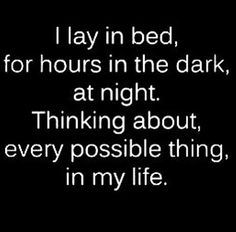
Whatever feeling you may discover, you don’t have to fix it. “Notice any places where you feel tightness, numbness, warmth, cold, or any other physical sensation,” says Gamble. Do what’s called a body scan meditation, where you systematically send your attention to each part of the body, starting at the head and working, inch-by-inch, down to your toes. And the perfect thing to pay attention to is your body, says Gamble. Of course, your mind doesn’t just shut off-you have to give it something else to focus on so that it doesn’t start racing again. “Such rational thinking is challenging in the moment, but it helps to put things into perspective.” 3. “If you try to think back to what kept you awake a week ago, a month ago, you probably don’t even remember,” adds Dr. “We’re going to think about this again in the morning-after we’ve had some rest.” She counsels her clients who have trouble sleeping because of an overactive mind to remember that middle-of-the-night thinking never pans out. It’s not rude,” says Sarah Gamble, a licensed acupuncturist. “You are allowed to interrupt your own thoughts. “This takes it out of your head so you can let it go.” 2. Adam Perlman, meQuilibrium’s Co-founder and Chief Medical Officer, recommends keeping a pen and pad by your bed: “Whether it’s something you don’t want to forget to do, or something you’re stressed about, rather than ruminating about it, write it down,” he says. One way to combat this? Before going to bed, jot down what’s on your mind. As a result, we get worked up just as we’re supposed to wind down. Stephanie Hartselle, a psychiatrist and Assistant Professor at Brown University. Because we don’t process much during the day, it hits us in the quiet of night,” explains Dr.

Why do our worries ramp up after dark? “It’s rare to be alone with one’s thoughts until night. To help you settle down enough to sleep, here are five ways to quiet your mind and lull your body into a primed-for-rest state: 1. While there are many issues that can contribute to sleeplessness, an anxious mind is one of the most common challenges people suffering from insomnia face. If this sounds familiar, you certainly aren’t alone: Studies show that insomnia affects approximately one-third of the world’s population, which means there are literally billions of people out there struggling to get the sleep they need. But now your mind is churning out so many thoughts, you can’t fall asleep. In fact, you could barely keep your eyes open a half-hour ago when you were streaming your favorite show. Picture this: You’re cozy in bed, the lights are out, the room is quiet-and you’re tired.


 0 kommentar(er)
0 kommentar(er)
